Difference between revisions of "August 7, 2011"
| Line 29: | Line 29: | ||
<br /> | <br /> | ||
<strong>Related Links</strong><br /> | <strong>Related Links</strong><br /> | ||
| − | Rükl plate [https://the-moon.us/wiki/R%C3% | + | Rükl plate [https://the-moon.us/wiki/R%C3%BCkl_56 56]<br /> |
<br /> | <br /> | ||
<hr /> | <hr /> | ||
Latest revision as of 17:44, 13 October 2018
Potpourri

LRO WAC mosaic from WAC Global View (NASA/GSFC/Arizona State University)
In looking in detail at part of one of the Lunar Reconnaissance Orbiter Wide Angle Camera (a mouthful) mosaics
today I noted a number of interesting small features; thus this lunar potpourri. The last word refers to dried and
fragrant flowers and other plant material. The Moon is dry (mostly), astronauts noticed a smell like gun powder,
it is our flower of the evening sky, and by adding one more letter we get planAt material - so potpourri it is. Here
are four fascinating features. Starting near top left is a feature I've lettered Parrot DA - it is officially unlettered, but
is next to Parrot D (the crater to the left of the DA type). DA is almost like a concentric crater. It has a ridge that
continues around the crater rim, just a little below the rim crest. It doesn't look volcanic but seems more like a
uniform slide downward of rim material. Odd and weird. Move east to Burnham (marked with a +). It may be an old
basin secondary made up of multiple overlapping craters. The thing that caught my eye is the mass of bumps and
hills on the floor - where did they come from? They look too big to simply be material slumped off the rim. The next
minor oddity is Abulfeda D. This teardrop-shaped crater is one of the asymmetrical secondaries from the Nectaris
Basin that Bill Ambrose mapped. They formed by low speed and low angle oblique impacts. The final stop on this
magical tour is Abulfeda F near bottom right. This non-circular crater is made of two circular parts with a missing
wall where they intersect. This is the morphological signature of a simultaneous impact. This could have formed
as a higher angle secondary from Nectaris but it is much fresher than other Nectaris secondaries and isn't radial
to the basin - two fatal flaws. Perhaps it resulted from a single impact of an asteroid or comet that was pulled into
two pieces by the Moon's gravity and separated only a little before impact. If you look around you will find other
intriguing objects to investigate.
Chuck Wood
Related Links
Rükl plate 56
Yesterday's LPOD: Layers of History
Tomorrow's LPOD: Everything is Self-Evident - Maybe
COMMENTS?
Register, Log in, and join in the comments.



